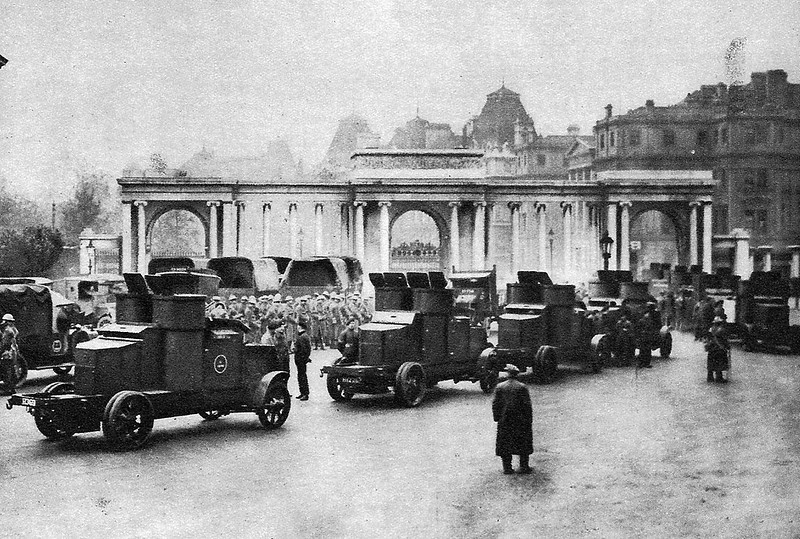Whenever strikes are in the news it’s almost inevitable that the media will discuss the possibility of a general strike occurring in the UK. While not in itself an unfair question, a general strike has not occurred since 1926. There are quite a lot of reasons why that feat would be hard to reproduce now: any trade unions which took part would have their funds sequestered by the government, and any union members who took part would lose any protection from instant dismissal from their employers. Even when these harsh laws were not in place, it was not a tactic seriously considered after 1926 due to the trade union movement being so divided; in 1957 Julian Symons deemed it “hopelessly out of date in means and method”. So it’s worth asking what is driving trade union coverage being saturated with article after article on the prospect of a general strike in the future?
To so much of the media, a general strike represents the end boss of British trade unionism, where the government and unions enter a showdown and only one winner emerges. For journalists used to covering Westminster politics, it makes sense they would view unions merely as one of the many thorns in the side of the government which has to be dealt with. The media doesn’t understand how unions are structured, many journalists cannot countenance the idea that a union general secretary does not act as a dictator, and that members actually have a say in what action is taken or not taken. The idea that the TUC is the boss of all other unions is also implicit to all general strike coverage, or in some cases explicit. For the vast majority of the media, an imaginary trade union movement – one capable of holding a general strike – will always be more appealing than the existing one.
When UNISON General Secretary Christina McAnea tried to explain to Sky’s Sophy Ridge why a General Strike was a “virtual impossibility” but coordinated action was not, the headline Sky chose for the interview was “General Strike ‘not impossible”. Despite McAnea’s valiant efforts to explain the consequences of such a strike, Ridge seemed to come away from the exchange believing the only difference between coordinated strike action and a general strike was semantics. The problem is not specific to Westminster coverage though, industrial relations literacy is so low that in a Guardian explainer, the definition of secondary picketing was incorrectly stated as “strikers attending each others’ protests”.
To give lobby journalism a generosity it does not deserve, others that should know better occasionally slide into parody on the subject. Some trade unionists and left wing activists often offer it as the solution in times of heightened industrial action. The reasons why are as broad as believing it will usher in a full blown revolution, to simply desiring the largest representation of solidarity and disruption possible for a given dispute. While most calls for a general strike since 1926 have come from fringe revolutionary groups like the Workers Revolutionary Party, the most high profile call since 1972 came recently from RMT General Secretary Mick Lynch. Lynch expressed his desire for a 24-hour general strike this spring. A little closer to reality, however, were his own comments from a month ago playing down the prospect of a 1926-style general strike. Union leaders getting carried away and calling for a general strike in front of a cheering crowd is not a new occurrence.
The 1926 general strike was certainly not a footnote in the history of British industrial relations, but any calls for it since have been. So why does it occupy so much of the consciousness of the British media? Certainly no elements of the strike itself feature in today’s union coverage; Stanley Baldwin isn’t a by-word for crushing unions in the press, Miners’ Federation of Great Britain General Secretary A.J. Cook isn’t held up as a symbol of lost causes to compare with modern union leaders. The 1927 Trade Disputes and Trade Unions Act really was the swift and vindictive legislative assault on trade unions many journalists have mythologised Margaret Thatcher’s initial 1980 Employment Act as.
The strike itself is in danger of entering the ‘Things We Forgot To Remember’ category of British history. Broadcasters are obsessed with the idea of a future general strike, but can’t even get the year it occurred right when attempting to tie modern day politicians to supporting a future one. Much like the supposedly imminent comebacks of Boris Johnson, Tony Blair, David Miliband, or Ed Balls, the actual likelihood or mechanism by which a general strike happens doesn’t matter, just the prospect is enough to drive clicks and engagement.
Journalists endlessly quizzing Mick Lynch on the prospect of a general strike and giving pro-remain campaigners like AC Grayling and Jolyon Maugham national platforms to call for general strikes to stop Brexit come from the same instinct. The media yearns for a trade union movement capable of delivering the kind of showdown they desire. This is not merely born from the death of industrial relations journalism, but the decline of the labour movement in general. The current strength of the labour movement (or lack thereof), restrictive union laws, and actual views of members or indeed general secretaries are irrelevant to a media which only pays attention to unions when strikes occur.
For an uncaring media, the allure of an imagined past to drive sensationalised stories about the potential of a general strike will always be stronger than reality-based reporting. The media sees trade unions as a thing of the past, whose only use is in grander stories about Westminster drama. It does not take a historian of the trade union movement to understand the complexities of a general strike as something more than a big strike and to see why it could not happen today; rather, it simply demands a media class willing to engage with the trade union movement as it actually exists.


